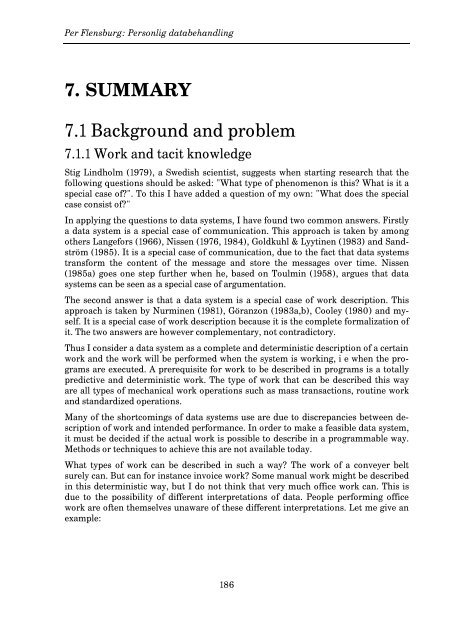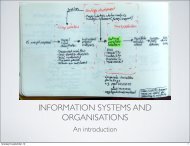Flensburg P: Personlig databehandling - Per Flensburgs hemsida
Flensburg P: Personlig databehandling - Per Flensburgs hemsida
Flensburg P: Personlig databehandling - Per Flensburgs hemsida
You also want an ePaper? Increase the reach of your titles
YUMPU automatically turns print PDFs into web optimized ePapers that Google loves.
<strong>Per</strong> <strong>Flensburg</strong>: <strong><strong>Per</strong>sonlig</strong> <strong>databehandling</strong><br />
7. SUMMARY<br />
7.1 Background and problem<br />
7.1.1 Work and tacit knowledge<br />
Stig Lindholm (1979), a Swedish scientist, suggests when starting research that the<br />
following questions should be asked: "What type of phenomenon is this? What is it a<br />
special case of?". To this I have added a question of my own: "What does the special<br />
case consist of?"<br />
In applying the questions to data systems, I have found two common answers. Firstly<br />
a data system is a special case of communication. This approach is taken by among<br />
others Langefors (1966), Nissen (1976, 1984), Goldkuhl & Lyytinen (1983) and Sandström<br />
(1985). It is a special case of communication, due to the fact that data systems<br />
transform the content of the message and store the messages over time. Nissen<br />
(1985a) goes one step further when he, based on Toulmin (1958), argues that data<br />
systems can be seen as a special case of argumentation.<br />
The second answer is that a data system is a special case of work description. This<br />
approach is taken by Nurminen (1981), Göranzon (1983a,b), Cooley (1980) and myself.<br />
It is a special case of work description because it is the complete formalization of<br />
it. The two answers are however complementary, not contradictory.<br />
Thus I consider a data system as a complete and deterministic description of a certain<br />
work and the work will be performed when the system is working, i e when the programs<br />
are executed. A prerequisite for work to be described in programs is a totally<br />
predictive and deterministic work. The type of work that can be described this way<br />
are all types of mechanical work operations such as mass transactions, routine work<br />
and standardized operations.<br />
Many of the shortcomings of data systems use are due to discrepancies between description<br />
of work and intended performance. In order to make a feasible data system,<br />
it must be decided if the actual work is possible to describe in a programmable way.<br />
Methods or techniques to achieve this are not available today.<br />
What types of work can be described in such a way? The work of a conveyer belt<br />
surely can. But can for instance invoice work? Some manual work might be described<br />
in this deterministic way, but I do not think that very much office work can. This is<br />
due to the possibility of different interpretations of data. People performing office<br />
work are often themselves unaware of these different interpretations. Let me give an<br />
example:<br />
186







